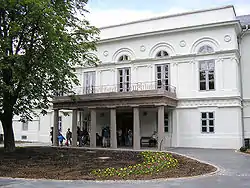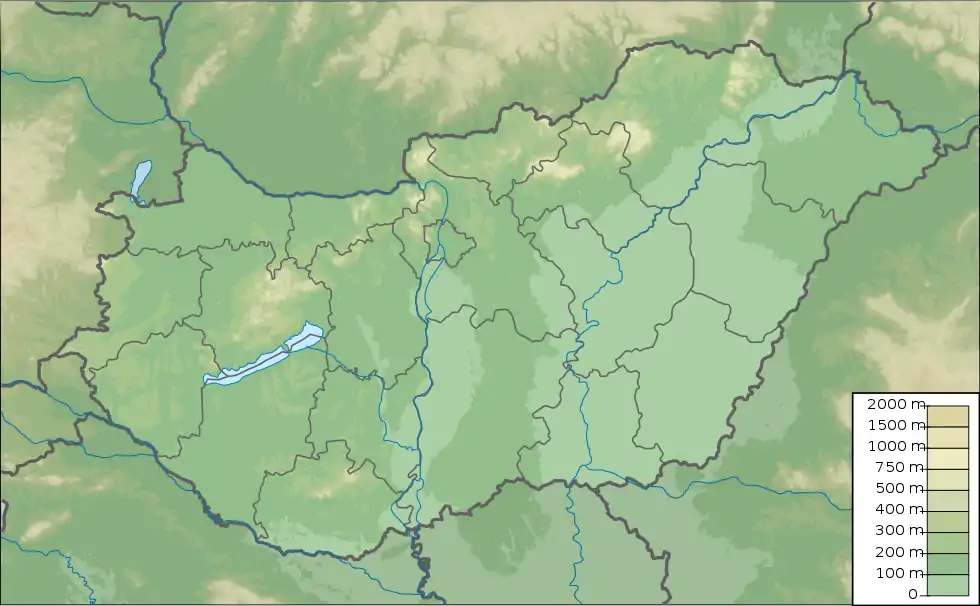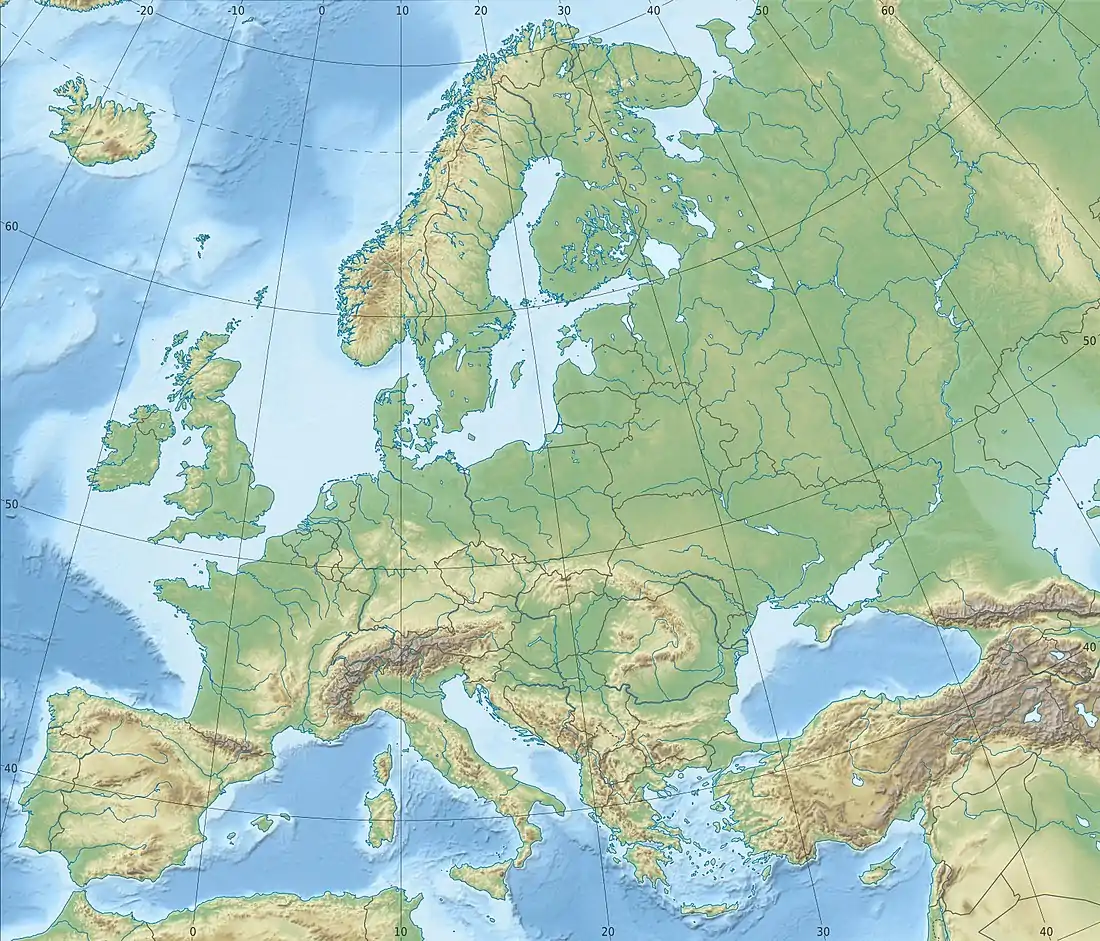Gyöngyös | |
|---|---|
 Orczy palace of Orczy family | |
 Flag  Coat of arms | |
 Gyöngyös Location of Gyöngyös  Gyöngyös Gyöngyös (Europe) | |
| Coordinates: 47°47′00″N 19°56′00″E / 47.7833°N 19.9333°E | |
| Country | |
| County | Heves |
| District | Gyöngyös |
| Area | |
| • Total | 54.1 km2 (20.9 sq mi) |
| Population (2001) | |
| • Total | 33,553 |
| • Density | 620/km2 (1,600/sq mi) |
| Time zone | UTC+1 (CET) |
| • Summer (DST) | UTC+2 (CEST) |
| Postal code | 3200 |
| Area code | (+36) 37 |
| Website | www |
Gyöngyös (Hungarian pronunciation: [ˈɟøɲɟøʃ]) is a town in Heves county in Hungary, 80 km (50 mi) east of Budapest. Situated at the foot of the Sár-hegy and Mátra mountains, it is the home of numerous food production plants, including milk production and sausage factories. It is also the home of many vineyards on the slopes of the Sárhegy.
The Art-Nouveau and Baroque buildings around the main square were reconstructed after a disastrous fire started in the local hospital in 1917,[1] destroying a number of buildings housing important Jewish institutions and leaving in all around 8,000 homeless.[2]
Name


The meaning of the town's name is "Made of Pearls"; Croats from Hungary call this city Đunđuš Serbo-Croatian pronunciation: [ˈdʑûndʑuʃ]. The 16/17th-century historian Miklós Istvánffy wrote that the name of the town comes from the Hungarian word for mistletoe (fagyöngy literally "wood-pearl"), which is abundant in the local woods.
History
Gyöngyös was home to a large Jewish community before World War II. In 1942, anti-Jewish laws were adopted in the province, affecting the Jews of the town.[3] Following the occupation of Hungary by the German army in March 1944, 1800 Jews were locked in a ghetto. Some were saved by Hungarian Righteous Among the Nations personnel but most of them were deported to Auschwitz where they were murdered.[4]
Sights to visit
There are many monuments and places of interest in the town, such as the Orczy mansion, home of the Mátra Museum, Saint Bartholomew's Church (Saint Bartholomew Church, Gyöngyös, Hungary) in the center of town, and its Treasury.
Notable residents
- Gyöngyi Horváth, sociologist, conference organiser
- Rudolph Ritter von Brudermann (1851–1941), general of Austria-Hungary during the First World War
- Béla Kerékjártó (1898–1946), mathematician
- Sandor Kenyeres (born 1949), property developer, scientific philanthropist, and cultural visionary
- Gedeon Richter (1872–1944), pharmacist, business magnate, philanthropist, founder of Gedeon Richter plc, pioneer of the Hungarian pharmaceutical industry
- Soma Visontai (1854–?), lawyer, deputy
- Paul Vay de Vaya (1735–1800), Major General (1794), Feldmarschall-leutnant (1799–1800)
- Margit Gréczi (born 1941), painter
- Zita Pataki (born 1973), weather presenter
Politics
- Gábor Vona (born 1978), politician, leader of the political party Jobbik
- Gábor Fodor (born 1962), jurist, politician, leader of the Hungarian Liberal Party
- Pál Almásy (1818–1882), lawyer, politician, Speaker of the House of Representatives (1849)
- Károly Kamermayer (1829–1897), jurist, councillor, the first mayor of Budapest (1873–1896)
- József Balázs (born 1965), politician
- Gabor Horváth, (born 1963) brigadier general, army carrier officer, promoter of NATO and EU membership, commander
Sports
- Viktor Szabó (born 1986), footballer
- Dárius Csillag (born 1995), footballer
- Dávid Ficsór (born 1986), footballer
- Gergő Gohér (born 1987), footballer
- András Herczeg (born 1956), football manager, former player, manager of Debreceni VSC
- Zsófia Kovács (born 1988), professional triathlete
- József Éles (born 1969), former handball player, handball coach of the Dominican Republic women's national team
- Attila Szekrényessy (1913–1995), pair skater
- Gabriella Csépe (born 1973), swimmer
- László Polgár (born 1946), educational psychologist and developer of educational method to develop "stars" (whom he calls "geniuses"). He and his wife Klára used his method to develop daughters Zsuzsa Susan Polgár, Zsófi Sofia Polgár and Judit Polgár into the world's leading chess players, Olympic champions. His paternal grandfather in yöngyös was a great Talmudic scholar.
- Energia SC Gyöngyös (1992–present), football club
Twin towns – sister cities
 Luohe, China
Luohe, China Manisa, Turkey
Manisa, Turkey Pieksämäki, Finland
Pieksämäki, Finland Ringsted, Denmark
Ringsted, Denmark Sanok, Poland
Sanok, Poland Štip, North Macedonia
Štip, North Macedonia Târgu Secuiesc, Romania
Târgu Secuiesc, Romania Zeltweg, Austria
Zeltweg, Austria Shusha, Azerbaijan
Shusha, Azerbaijan
Gallery
 Aerial photograph of the water tower, built in 1927.
Aerial photograph of the water tower, built in 1927.
References
- ↑ Charles Hebbert; Norm Longley; Dan Richardson (2002). Hungary (Rough Guide Travel Guides). Rough Guides Ltd. p. 323. ISBN 1-85828-917-3.
- ↑ Adrian Phillips, Jo Scotchmer (2010). Bradt Travel Guides. Hungary. p. 222. ISBN 978-1-84162-285-9.
- ↑ "Horváth Kálmán". The Righteous Among the Nations Database. Retrieved 18 December 2020.
- ↑ "המכון הבין-לאומי לחקר השואה – יד ושם". www.yadvashem.org (in Hebrew).
- ↑ "Gyöngyös testvérvárosai" (in Hungarian). Gyöngyös. Retrieved 21 September 2021.
External links
- Official website (in Hungarian and English).
- "Gyöngyös információs és hír enciklopédiája-Minden egy helyen! - Kezdőlap". gyongyos.info (in Hungarian). Archived from the original on 15 October 2007.

